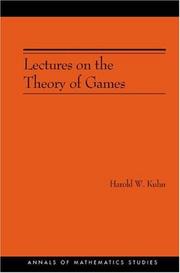| Listing 1 - 2 of 2 |
Sort by
|
Book
ISBN: 9780226097039 9780226097176 022609717X 022609703X 022609720X 9780226097206 Year: 2015 Publisher: Chicago : University of Chicago Press,
Abstract | Keywords | Export | Availability | Bookmark
 Loading...
Loading...Choose an application
- Reference Manager
- EndNote
- RefWorks (Direct export to RefWorks)
In recent decades game theory-the mathematics of rational decision-making by interacting individuals-has assumed a central place in our understanding of capitalist markets, the evolution of social behavior in animals, and even the ethics of altruism and fairness in human beings. With game theory's ubiquity, however, has come a great deal of misunderstanding. Critics of the contemporary social sciences view it as part of an unwelcome trend toward the marginalization of historicist and interpretive styles of inquiry, and many accuse its proponents of presenting a thin and empirically dubious view of human choice. The World the Game Theorists Made seeks to explain the ascendency of game theory, focusing on the poorly understood period between the publication of John von Neumann and Oscar Morgenstern's seminal Theory of Games and Economic Behavior in 1944 and the theory's revival in economics in the 1980s. Drawing on a diverse collection of institutional archives, personal correspondence and papers, and interviews, Paul Erickson shows how game theory offered social scientists, biologists, military strategists, and others a common, flexible language that could facilitate wide-ranging thought and debate on some of the most critical issues of the day.
Operational research. Game theory --- Game theory --- Science --- Methodology --- Von Neumann, John, --- Science - Methodology --- Von Neumann, John, - 1903-1957. - Theory of games and economic behavior --- Game theory. --- Methodology. --- Scientific method --- Logic, Symbolic and mathematical --- Games, Theory of --- Theory of games --- Mathematical models --- Mathematics --- game theory, rationalism, reason, decision making, social interaction, individuals, capitalism, markets, altruism, fairness, society, trust, justice, philanthropy, charity, games and economic behavior, economics, military strategy, biology, programming, nonfiction, psychology, political science, cold war, arms race, information processing, interdisciplinary, history, john von neumann, oscar morgenstern, evolution, motivation.

ISBN: 0691027714 0691027722 9786612159114 1282159119 1400829569 9781400829569 9781282159112 6612159111 9780691027715 9780691027722 Year: 2003 Volume: 37 Publisher: Princeton, N.J. : Princeton University Press,
Abstract | Keywords | Export | Availability | Bookmark
 Loading...
Loading...Choose an application
- Reference Manager
- EndNote
- RefWorks (Direct export to RefWorks)
This book is a spectacular introduction to the modern mathematical discipline known as the Theory of Games. Harold Kuhn first presented these lectures at Princeton University in 1952. They succinctly convey the essence of the theory, in part through the prism of the most exciting developments at its frontiers half a century ago. Kuhn devotes considerable space to topics that, while not strictly the subject matter of game theory, are firmly bound to it. These are taken mainly from the geometry of convex sets and the theory of probability distributions. The book opens by addressing "matrix games," a name first introduced in these lectures as an abbreviation for two-person, zero-sum games in normal form with a finite number of pure strategies. It continues with a treatment of games in extensive form, using a model introduced by the author in 1950 that quickly supplanted von Neumann and Morgenstern's cumbersome approach. A final section deals with games that have an infinite number of pure strategies for the two players. Throughout, the theory is generously illustrated with examples, and exercises test the reader's understanding. A historical note caps off each chapter. For readers familiar with the calculus and with elementary matrix theory or vector analysis, this book offers an indispensable store of vital insights on a subject whose importance has only grown with the years.
Operational research. Game theory --- Game theory --- 519.83 --- Theory of games --- 519.83 Theory of games --- Game theory. --- Games, Theory of --- Mathematical models --- Mathematics --- Abstract algebra. --- Addition. --- Algorithm. --- Almost surely. --- Analytic geometry. --- Axiom. --- Basic solution (linear programming). --- Big O notation. --- Bijection. --- Binary relation. --- Boundary (topology). --- Bounded set (topological vector space). --- Branch point. --- Calculation. --- Cardinality of the continuum. --- Cardinality. --- Cartesian coordinate system. --- Characteristic function (probability theory). --- Combination. --- Computation. --- Connectivity (graph theory). --- Constructive proof. --- Convex combination. --- Convex function. --- Convex hull. --- Convex set. --- Coordinate system. --- David Gale. --- Diagram (category theory). --- Differential equation. --- Dimension (vector space). --- Dimensional analysis. --- Disjoint sets. --- Distribution function. --- Embedding. --- Empty set. --- Enumeration. --- Equation. --- Equilibrium point. --- Equivalence relation. --- Estimation. --- Euclidean space. --- Existential quantification. --- Expected loss. --- Extreme point. --- Formal scheme. --- Fundamental theorem. --- Galois theory. --- Geometry. --- Hyperplane. --- Inequality (mathematics). --- Infimum and supremum. --- Integer. --- Iterative method. --- Line segment. --- Linear equation. --- Linear inequality. --- Matching Pennies. --- Mathematical induction. --- Mathematical optimization. --- Mathematical theory. --- Mathematician. --- Mathematics. --- Matrix (mathematics). --- Measure (mathematics). --- Min-max theorem. --- Minimum distance. --- Mutual exclusivity. --- Prediction. --- Probability distribution. --- Probability interpretations. --- Probability measure. --- Probability theory. --- Probability. --- Proof by contradiction. --- Quantity. --- Rank (linear algebra). --- Rational number. --- Real number. --- Requirement. --- Scientific notation. --- Sign (mathematics). --- Solution set. --- Special case. --- Statistics. --- Strategist. --- Strategy (game theory). --- Subset. --- Theorem. --- Theory of Games and Economic Behavior. --- Theory. --- Three-dimensional space (mathematics). --- Total order. --- Two-dimensional space. --- Union (set theory). --- Unit interval. --- Unit square. --- Vector Analysis. --- Vector calculus. --- Vector space.
| Listing 1 - 2 of 2 |
Sort by
|

 Search
Search Feedback
Feedback About UniCat
About UniCat  Help
Help News
News